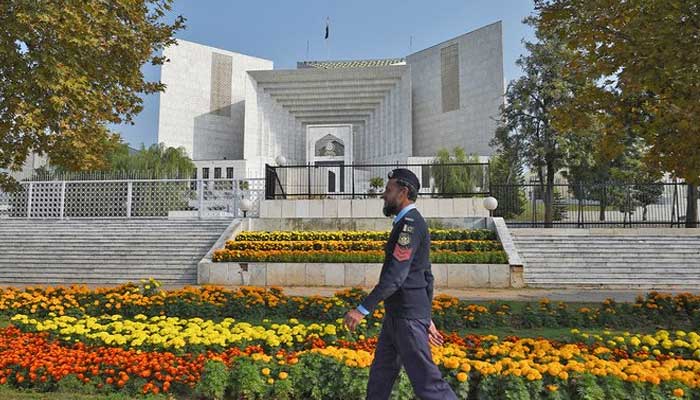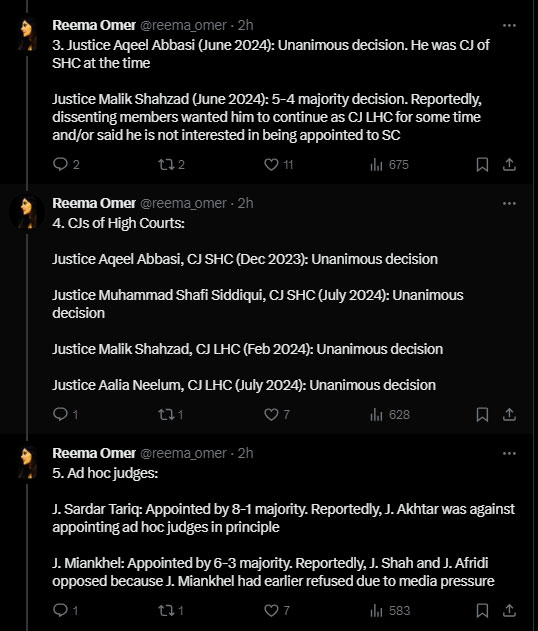Citing JCP record, legal expert rebuts 'fearmongering to pack SC with govt judges'
The judges appointed to SC since September 2023 cannot be considered "govt’s judges", says Reema Omer
September 09, 2024

- Expert says nearly all decisions made by JC have been unanimous.
- Private member bills to increase of SC judges "hasty": Omer
- Bill don’t establish as more judges solution to pendency: expert.
Amid speculations that the recently tabled legislation on increasing the number of Supreme Court judges is aimed at "court packing", legal expert Reema Omer rebutted the impression citing the Judicial Commission of Pakistan (JCP) record showing "unanimous" appointment of the judges to the top court.
The bill titled "Supreme Court (Number of Judges) (Amendment) Act", 2024, for strengthening apex court judges to 21 to "address the rising number of pending cases", was presented by an independent senator from Balochistan, Mohammad Abdul Qadir, on September 2.
The proposed legislation received strong criticism from opposition members, mainly from Pakistan Tehreek-e-Insaf (PTI), as Senator Syed Ali Zafar termed the amendments "an attempt to impose a judicial martial law" by bringing seven new judges.
Sharing her two cents on the controversy, Omer said that the ongoing speculations on the alleged collusion between the government and Chief Justice of Pakistan (CJP) Qazi Faez Isa for court packing are "not supported" by the JCP's record since the latter became the top judge in September 2023.
"That said, fearmongering regarding 'collusion' between the government and the CJP [chief justice of Pakistan] to pack the SC with 'Govt’s judges' is unnecessary and not supported by the Judicial Commission’s record," Omer wrote in a series of posts on social media site X.
She provided an overview of key nominations made by the judicial body since September 2023 when CJP Isa became the country's top judge.

Omer stated that the Judicial Commission of Pakistan (JCP) approved Justice (retired) Sardar Tariq appointment by 8-1 majority. Reportedly, Justice Munib Akhtar was against appointing ad hoc judges in principle, she added.
Likewise, the international law expert said Justice (retired) Mazhar Alam Miankhel was appointed as ad hoc judge of the top court by 6-3 majority. Reportedly, the expert said Justice Mansoor Ali Shah and Justice Yahya Afridi "opposed because J. Miankhel had earlier refused due to media pressure".
"Nearly all decisions made by JC have been unanimous. The 5 judges appointed to SC since September cannot be considered 'govt’s judges' - there has been no 'court packing'. At least 2 judges appointed to SC in this period have already ruled differently from CJP," the expert stated in one of the posts.
She added that the private member bills to increase the number of SC judges are "hasty and don’t refer to any data to show more judges is the solution to pendency in Pakistan".
Omer suggested that the government should not support these bills unless more work is done on understanding the reasons for pendency and the apex court is consulted on the matter.
It may be noted that a similar private member bill proposing same amendments to the Supreme Court (Number of Judges) Act, 1997, was introduced in the National Assembly as well, which was deferred by the speaker.











